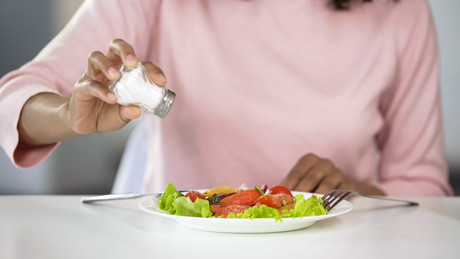It's ok to enjoy salt with your meal
Tuesday, 14 August, 2018

If you enjoy salt with your meal, relax. New research has found that unless you’re consuming more than 5 grams a day — or 2.5 teaspoons of salt — you have nothing to worry about.
Fewer than 5% of individuals in developed countries exceed that level, and even for these individuals there is good news: any health risk of sodium intake is virtually eliminated if people improve their diet quality by adding fruits, vegetables, dairy foods, potatoes and other potassium-rich foods.
The research is by scientists of the (PHRI) of and , along with their research colleagues from 21 countries.
The study, published in , followed 94,000 people, aged 35 to 70, for an average of eight years in communities from 18 countries around the world and found there is an associated risk of cardiovascular disease and strokes only where average intake is greater than five grams of sodium a day.
China is the only country in their study where 80% of communities have a sodium intake of more than 5 grams a day. In the other countries, the majority of the communities had an average sodium consumption of 3 to 5 grams a day (equivalent to 1.5 to 2.5 teaspoons of salt).
“T��� recommends consumption of less than 2 grams of sodium — that’s one teaspoon of salt — a day as a preventative measure against cardiovascular disease, but there is little evidence in terms of improved health outcomes that individuals ever achieve at such a low level,” said Andrew Mente, first author of the study and a PHRI researcher.
He added that the recommends even less — 1.5 grams of sodium a day for individuals at risk of heart disease.
“Only in the communities with the most sodium intake — those over 5 grams a day of sodium — which is mainly in China, did we find a direct link between sodium intake and major cardiovascular events like heart attack and stroke.
“In communities that consumed less than 5 grams of sodium a day, the opposite was the case. Sodium consumption was inversely associated with myocardial infarction or heart attacks and total mortality, and no increase in stroke.”
Mente added: “We found all major cardiovascular problems, including death, decreased in communities and countries where there is an increased consumption of potassium which is found in foods such as fruits, vegetables, dairy foods, potatoes and nuts and beans.”
Most previous studies relating sodium intake to heart disease and stroke were based on individual-level information, said Martin O’Donnell, co-author of the report, a PHRI researcher and an Associate Clinical Professor of Medicine at McMaster.
“Public health strategies should be based on best evidence. Our findings demonstrate that community-level interventions to reduce sodium intake should target communities with high sodium consumption, and should be embedded within approaches to improve overall dietary quality.
“T���re is no convincing evidence that people with moderate or average sodium intake need to reduce their sodium intake for prevention of heart disease and stroke,” said O’Donnell.
Medicare chronic wound care scheme set to benefit 20,000/year
The Chronic Wound Consumables Scheme has launched, giving older Australians with diabetes —...
Westmead ���ϳԹ�Ⱥ�� to gain $492m pathology hub
The new NSW Health Pathology Statewide Hub at Westmead ���ϳԹ�Ⱥ�� will be the largest public...
NSW reforms to see trained GPs treat and diagnose ADHD
NSW will enable trained GPs to provide ongoing ADHD prescriptions for those on stable doses of...





